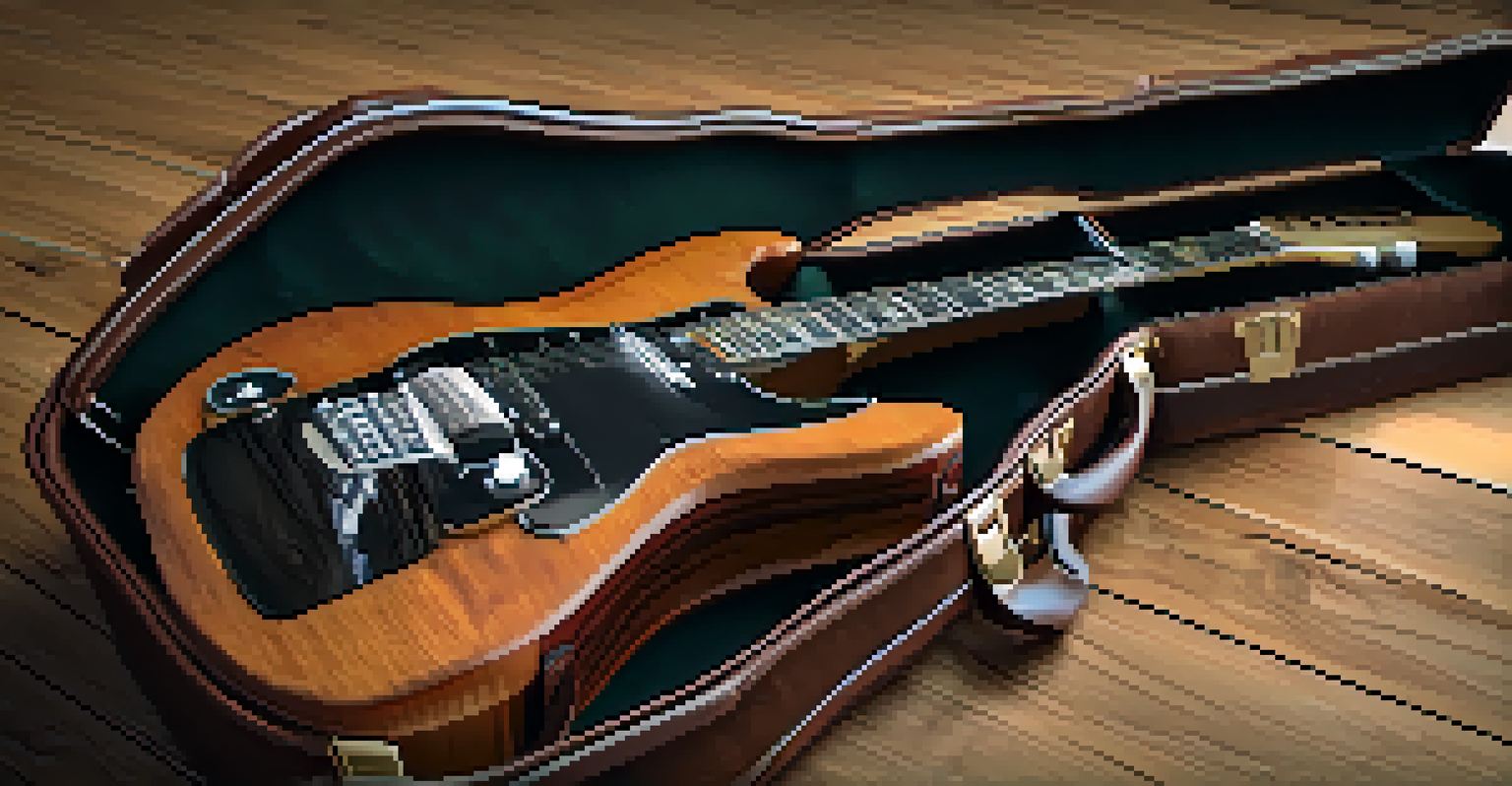Guitar Cases: Choosing Hard vs. Soft for Protection

Understanding the Basics of Guitar Case Types
When it comes to protecting your guitar, choosing the right case is crucial. There are primarily two types of cases: hard and soft. Each offers distinct advantages depending on your needs, lifestyle, and how you transport your instrument.
A guitar is more than just an instrument; it's a companion that deserves the best protection.
Hard cases are typically made from sturdy materials like wood or molded plastic, providing a solid barrier against impacts. Conversely, soft cases, or gig bags, are usually padded and lightweight, making them easier to carry around. Understanding these basics is the first step to making an informed decision.
Ultimately, your choice will depend on factors like how often you travel with your guitar, the level of protection you require, and your personal preferences. Let's dive deeper into the benefits of both options.
The Advantages of Hard Guitar Cases
Hard guitar cases are known for their robust construction, which offers superior protection against drops and impacts. If you're a touring musician or someone who frequently travels, a hard case can safeguard your guitar from the rigors of transport.

In addition to physical protection, hard cases often provide a snug fit, which minimizes movement inside the case. This is important because excessive movement can lead to damage over time, particularly to delicate parts like the neck or headstock.
Choose Between Hard and Soft Cases
Selecting the right guitar case depends on your travel habits and protection needs.
Moreover, many hard cases come with added features like storage compartments for accessories, locks for security, and weather-resistant materials. All these elements make hard cases a popular choice among serious musicians who prioritize their instrument's safety.
The Perks of Soft Guitar Cases
Soft guitar cases, or gig bags, are often favored for their lightweight and portable design. They are perfect for musicians who need to carry their instruments in crowded spaces or for short distances, like local gigs or lessons.
Invest in your instrument; it's the one thing that can bring your music to life.
Another advantage of soft cases is their versatility. Many gig bags come with extra pockets for storing picks, strings, and sheet music, making it convenient for quick access. Plus, they can be more affordable than hard cases, which is a bonus for budget-conscious musicians.
While they may not offer the same level of protection as hard cases, soft cases often include padding that provides decent shock absorption. This makes them suitable for everyday use, especially if you're careful and aware of your surroundings.
Assessing Your Travel Needs for Guitar Cases
Consider how you usually transport your guitar when deciding on a case. If you're frequently on the road, a hard case may be your best bet to ensure maximum protection. On the other hand, if you primarily play at home or take your guitar to local events, a soft case could suffice.
Take into account the type of vehicle you use as well. If you often travel in a cramped car or public transport, a lightweight soft case might be easier to handle. However, if you have a dedicated space for your guitar, a hard case could be a better fit.
Hard Cases Offer Superior Protection
Hard cases are ideal for touring musicians due to their robust construction and added features.
Ultimately, assessing your lifestyle and travel habits will guide you in selecting the right case. Understanding your specific needs can help you make a choice that balances convenience and protection.
Price Comparison: Hard vs. Soft Guitar Cases
When it comes to budget considerations, there's a noticeable difference between hard and soft cases. Generally, hard cases are more expensive due to their durable materials and construction. If you're investing in a high-quality guitar, it might make sense to spend a bit more for added protection.
On the flip side, soft cases tend to be more affordable, making them an attractive option for beginners or casual players. You can often find decent quality gig bags at a fraction of the price of hard cases, allowing you to allocate your budget elsewhere.
It’s essential to weigh the price against the level of protection you need. While saving money is important, investing in a quality case that fits your lifestyle can ultimately save you from costly repairs.
Storage and Convenience Features in Guitar Cases
Both hard and soft cases come with their own set of storage features that can enhance convenience. Hard cases usually have built-in storage compartments, allowing you to keep your accessories organized and secure. This is especially useful for musicians who need quick access to items during performances.
On the other hand, soft cases often include multiple pockets and compartments for carrying additional gear. These bags can store everything from tuners to sheet music, making your life easier when you're on the go.
Soft Cases for Portability and Budget
Soft cases are lightweight and more affordable, making them great for casual players and local gigs.
In the end, the choice between hard and soft cases may also depend on how much gear you typically carry. If you often find yourself juggling multiple items, a soft case with extra storage may be the way to go.
Making the Final Decision: Hard vs. Soft Cases
By now, you should have a clearer picture of the benefits and drawbacks of both hard and soft guitar cases. The decision ultimately hinges on your personal needs, travel habits, and the value you place on protection versus convenience.
If your guitar is a significant investment and you frequently travel, a hard case may offer the peace of mind you need. However, if you're a casual player looking for ease of transport, a soft case could be perfectly adequate.

Take the time to evaluate your options and think about what matters most to you. Whether you choose hard or soft, investing in a good case is a crucial step in protecting your musical companion.